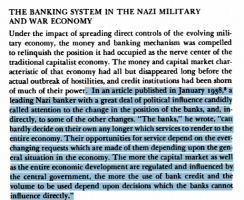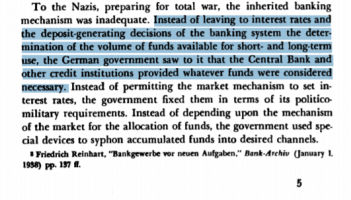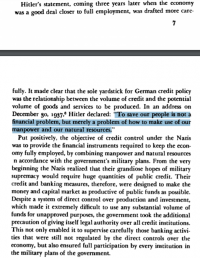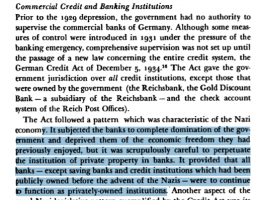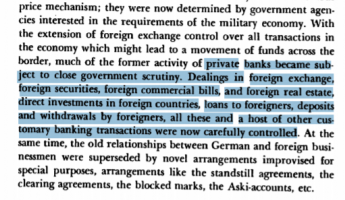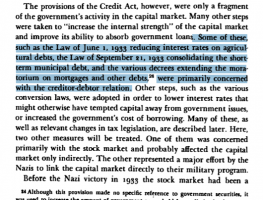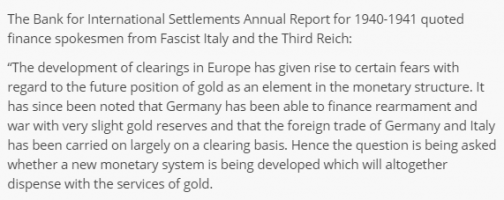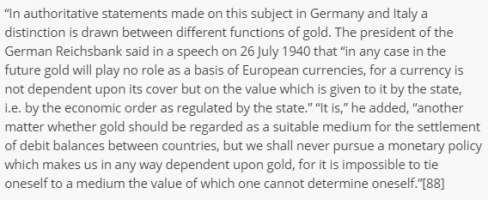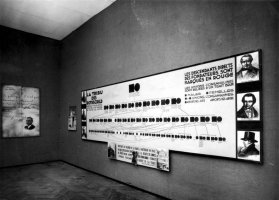what's the Peat explanation for blonde hair/blue eyes? a tendency to store different minerals in the hair/eyes?I do not know anything about him, but National Socialism was completely opposed to the Marxist conceptions of social order and largely on important economic policy. Despite sharing a critique of Capital (and from what I see Hilferding strongly criticized Finance Capital to which I would agree), their economic approaches were radically different. The Marxists wanted to Nationalize all industry and collectivize the farms, the National Socialists maintained private initiative so long as it did not clash with German interests as a whole. Marxism also de-emphasized the importance of Race, which was central to National Socialist ideology. Hilferding was Jewish and the wiki says he fled Germany in 1933 and later died in prison under the custody of the Gestapo in 1941. I cant know the circumstances of his death (and the wiki source appears to be speculation as well). All in all, I would say the his critique of Finance Capital was shared by the Nazis, but the Nazis also saw the struggle as not just against Finance Capital, but complete de-racination and destruction of Germany's bloodlines - which Hilferding I doubt would care for at all. Blood and Soil provides a simple understanding of the NS worldview, rather than simply being against Finance Capital. Although the latter is implied if the former is taken to its conclusions.
Navigation
Install the app
How to install the app on iOS
Follow along with the video below to see how to install our site as a web app on your home screen.
Note: This feature may not be available in some browsers.
More options
-
By using this site you agree to the terms, rules, and privacy policy.
-
Charlie's Restoration Giveaway #2 (Entire Home EMF Mitigation & Protection Along With Personal Protection) - Click Here To Enter
-
Dear Carnivore Dieters, A Muscle Meat Only Diet is Extremely Healing Because it is a Low "vitamin A" Diet. This is Why it Works so Well...
Rest the rest of this post by clicking here
-
The Forum is transitioning to a subscription-based membership model - Click Here To Read
Click Here if you want to upgrade your account
If you were able to post but cannot do so now, send an email to admin at raypeatforum dot com and include your username and we will fix that right up for you.
You are using an out of date browser. It may not display this or other websites correctly.
You should upgrade or use an alternative browser.
You should upgrade or use an alternative browser.
Klaus Schwab: Fascist and Nazi Heir
- Thread starter meatbag
- Start date
meatbag
Member
- Joined
- Jan 15, 2016
- Messages
- 1,771
It's interesting that even by the definition you provided the NAZI's and thier economic policies can't be categorized as socialists.I do not know anything about him, but National Socialism was completely opposed to the Marxist conceptions of social order and largely on important economic policy. Despite sharing a critique of Capital (and from what I see Hilferding strongly criticized Finance Capital to which I would agree), their economic approaches were radically different. The Marxists wanted to Nationalize all industry and collectivize the farms, the National Socialists maintained private initiative so long as it did not clash with German interests as a whole. Marxism also de-emphasized the importance of Race, which was central to National Socialist ideology. Hilferding was Jewish and the wiki says he fled Germany in 1933 and later died in prison under the custody of the Gestapo in 1941. I cant know the circumstances of his death (and the wiki source appears to be speculation as well). All in all, I would say the his critique of Finance Capital was shared by the Nazis, but the Nazis also saw the struggle as not just against Finance Capital, but complete de-racination and destruction of Germany's bloodlines - which Hilferding I doubt would care for at all. Blood and Soil provides a simple understanding of the NS worldview, rather than simply being against Finance Capital. Although the latter is implied if the former is taken to its conclusions.
"The Nazi government developed a partnership with leading German business interests, who supported the goals of the regime and its war effort in exchange for advantageous contracts, subsidies, and the suppression of the trade union movement. Cartels and monopolies were encouraged at the expense of small businesses, even though the Nazis had received considerable electoral support from small business owners.
Nazi Germany maintained a supply of slave labor, composed of prisoners and concentration camp inmates, which was greatly expanded after the beginning of World War II.
...after the Nazis took power, industries were privatized en masse.
Historian Adam Tooze writes that the leaders of German business were therefore "willing partners in the destruction of political pluralism in Germany."[58] In exchange, owners and managers of German businesses were granted unprecedented powers to control their workforce, collective bargaining was abolished and wages were frozen at a relatively low level.[59] Business profits also rose very rapidly, as did corporate investment"
NAZI economic policy is privatization of the economy in the interest of the militarized state, labor was composed in large fraction by, and treated as slaves.
Why do you think they called themselves the "National Socialists"?
Where did Hitler and the NAZI's get thier concept of the Aryan race and germanic bloodlines from?
meatbag
Member
- Joined
- Jan 15, 2016
- Messages
- 1,771
Plenty of women supported, were apologists for, and acted in NAZI interests;That shows not the face of Nazis, this shows the face oflow IQregular men (not women).
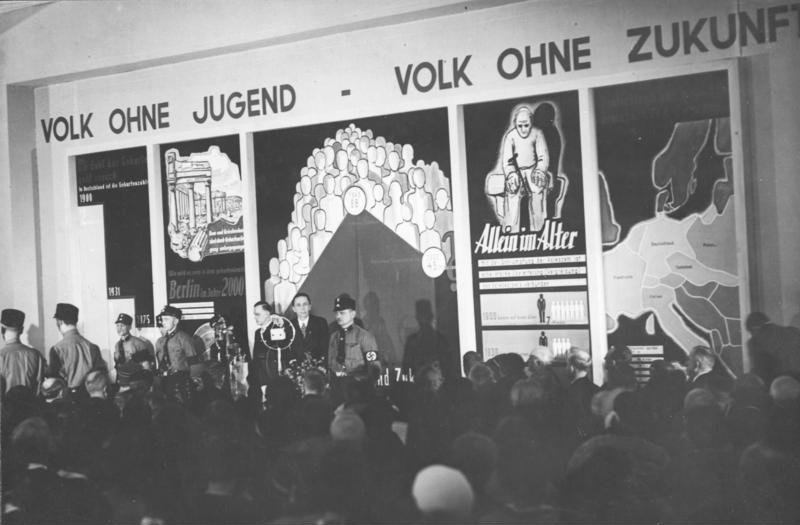
Women in Nazi Germany - Wikipedia
michael94
Member
- Joined
- Oct 11, 2015
- Messages
- 2,419
The Goals of the regime were the 4 year plan for German Autarky, and German National Sovereignty as a whole. Awarding contracts subsidies to companies that aligned with German self-sufficiency and the general well-being is a good thing. As for the suppression of the trade union movement, that's because the Trade Unions were notoriously run by Marxists, with Union Bosses that were often subversive to German National interests. For example at the end of WW1 Unions organized strikes that crippled German munitions production. The Trade Unions were replaced with the German Labor Front and actually had stronger influence than the Trade Unions. To say that collective bargaining stopped is inaccurate, it just happened on a larger more direct scale. It is just another strategy, which works if the Government is competent. A National Labor Front is a State Organization, and can bargain on behalf of the country's interests as a whole which includes every citizen. May not be the best for every country, but it did work well at the time. And wages were not frozen, that is ridiculous.It's interesting that even by the definition you provided the NAZI's and thier economic policies can't be categorized as socialists.
"The Nazi government developed a partnership with leading German business interests, who supported the goals of the regime and its war effort in exchange for advantageous contracts, subsidies, and the suppression of the trade union movement. Cartels and monopolies were encouraged at the expense of small businesses, even though the Nazis had received considerable electoral support from small business owners."
As for "forced Labor" prior to the War, was only for serious offenders. Once the War started they didnt really have a choice but to ruthlessly conscript labor.
michael94
Member
- Joined
- Oct 11, 2015
- Messages
- 2,419
Yes, they maintained private initiative so long as it didn't clash with the well-being of the German people. They did not have "Corporatism" or rule by Money as you see in modern Democracies. Business was completely subordinate to the State. This Lecture from a German Economist to visiting Americans explains the Germany Economy at the time (1938) much better than I can.Nazi Germany maintained a supply of slave labor, composed of prisoners and concentration camp inmates, which was greatly expanded after the beginning of World War II.
...after the Nazis took power, industries were privatized en masse.
Historian Adam Tooze writes that the leaders of German business were therefore "willing partners in the destruction of political pluralism in Germany."[58] In exchange, owners and managers of German businesses were granted unprecedented powers to control their workforce, collective bargaining was abolished and wages were frozen at a relatively low level.[59] Business profits also rose very rapidly, as did corporate investment"
NAZI economic policy is privatization of the economy in the interest of the militarized state, labor was composed in large fraction by, and treated as slaves.
Why do you think they called themselves the "National Socialists"?
Where did Hitler and the NAZI's get thier concept of the Aryan race and germanic bloodlines from?
Third Reich Economic Policy, 1933-1938
Third Reich Economic Policy, 1933-1938 By Wilhelm Bauer This overview of the economic policy of Germany during the first six years of Adolf Hitler’s National Socialist government was written by Dr. Wilhelm Bauer, an economist with the German Institute for Business Research (Institut für...
State and Business
The basis for all government intervention in business in Germany is to be found in the National-Socialist conception of the relation between business and the State. According to the German theory business is subordinated to the State. Formerly, it was believed that the fate of the State and of the nation lay in business, for it was said that business was of such great importance and so powerful that it controlled the State and determined State policies.
In the National-Socialist State the relation between, business and State is just the contrary. Today the State or State policy controls or rules business.
I must emphasize that in National-Socialist eyes the State incorporates in itself no absolute value as is the case, for instance, in an absolute monarchy. The supreme value is the nation, which we call in German Volksgemeinschaft, the community of the nation. The State is only the form of organization and the manifestation of the will of the people.
This means that the State is not concerned with economic conditions as long as they do not conflict with the welfare of the nation. The principle of private initiative has been maintained. However, where it seems necessary to bring business into line with the welfare of the nation, the State will not hesitate to intervene and direct business into the desired channels. In Germany, contrary to the usual belief, we have no "planned economy", but rather a "directed" economy, if I may use such an expression.
meatbag
Member
- Joined
- Jan 15, 2016
- Messages
- 1,771
I highly recommend the chapter from on Fascism from Sweezy's book, start on page 329 (337 on the website)Yes, they maintained private initiative so long as it didn't clash with the well-being of the German people. They did not have "Corporatism" or rule by Money as you see in modern Democracies. Business was completely subordinate to the State. This Lecture from a German Economist to visiting Americans explains the Germany Economy at the time (1938) much better than I can.

Third Reich Economic Policy, 1933-1938
Third Reich Economic Policy, 1933-1938 By Wilhelm Bauer This overview of the economic policy of Germany during the first six years of Adolf Hitler’s National Socialist government was written by Dr. Wilhelm Bauer, an economist with the German Institute for Business Research (Institut für...ihr.org
here's an ok summation: Sweezy on the Rise of Fascism | MR Online
"The month after being appointed Chancellor, Hitler made a personal appeal to German business leaders to help fund the Nazi Party for the crucial months that were to follow. He argued that they should support him in establishing a dictatorship because "private enterprise cannot be maintained in the age of democracy" and because democracy would allegedly lead to communism. In the following weeks, the Nazi Party received contributions from seventeen different business groups, with the largest coming from IG Farben and Deutsche Bank. Many of these businesses continued to support Hitler even during the war and even profited from persecution of the Jews. The most infamous being firms like Krupp, IG Farben, and some large automobile manufacturers. Historian Adam Tooze writes that the leaders of German business were therefore "willing partners in the destruction of political pluralism in Germany." In exchange, owners and managers of German businesses were granted unprecedented powers to control their workforce, collective bargaining was abolished and wages were frozen at a relatively low level.Business profits also rose very rapidly, as did corporate investment"
So, private owners of production were given complete control of thier workforce (the labour class)
"Even before the war, Nazi Germany maintained a supply of slave labor. "Undesirables" (German: unzuverlässige Elemente), such as the homeless, homosexuals, and alleged criminals as well as political dissidents, communists, Jews, and anyone else that the regime wanted out of the way were imprisoned in labor camps. Prisoners of war and civilians were brought into Germany from occupied territories after the German invasion of Poland. The necessary labor for the German war economy was provided by the new camp system, serving as one of the key instruments of terror. Historians estimate that some 5 million Polish citizens (including Polish Jews) went through them.Hundreds of thousands of people in occupied territories were used as slave labor by leading German corporations including Thyssen, Krupp, IG Farben, Bosch, Blaupunkt, Daimler-Benz, Demag, Henschel, Junkers, Messerschmitt, Philips, Siemens, Walther, and Volkswagen,on top of Nazi German startups which ballooned during this period,and all German subsidiaries of foreign firms including Fordwerke (Ford Motor Company) and Adam Opel AG (a subsidiary of General Motors). By 1944, slave labor made up one quarter of Germany's entire work force, and the majority of German factories had a contingent of prisoners. In rural areas the shortage of agricultural labor was filled by forced laborers from the occupied territories of Poland and the Soviet Union. The children of these workers were unwanted in Germany, and usually murdered inside special centers known as Ausländerkinder-Pflegestätte."
-Economy of Nazi Germany - Wikipedia
michael94
Member
- Joined
- Oct 11, 2015
- Messages
- 2,419
I made my point now youre just circling back around to what I responded to. Others can make their own conclusions
Missenger
Member
- Joined
- Mar 15, 2018
- Messages
- 720
You're replying to someone using wikipedia links as an argument.I made my point now youre just circling back around to what I responded to. Others can make their own conclusions
Pistachio
Member
- Joined
- Aug 22, 2019
- Messages
- 763
The Nazis did little to nothing to thwart Rothschild central banking.Yes National Socialism was so bad, they shouldve let the Private Banks and International Finance dictate their economy instead of organizing it for their own people's benefit. Silly Nazis
DrJ
Member
- Joined
- Jun 16, 2015
- Messages
- 723
Klaus Schwab can reset this ***k
michael94
Member
- Joined
- Oct 11, 2015
- Messages
- 2,419
The Reichsbank was put under NSDAP control, so that is incorrect. The Germans had complete control of their own money supply, and did not fund themselves by borrowing at interest from the Rothschilds or anyone else. On top of that, they completely flipped the power relation Usury had over vital components of the Germany society/economy. Farmers were given a blank slate on their debts when the Nazis came to power, newlyweds were given 1000 RM loans in the form of coupons for household items which was forgiven 25% for each child they had, and they spent money into the economy alongside productive work which provided another avenue of money hitting the economy without debt and in accordance with goods/services/resources/Nation well-being, as all money should be. Loans for speculation and unproductive activity were rarely sanctioned, which severely limited any financial net attempting to grow around the economy, as exists now. I will included sources of this below.The Nazis did little to nothing to thwart Rothschild central banking.
As a note, the author of this source claims that all of these efforts were for military aims, i.e. the Nazis planning to take over the world etc etc. which is something I don't accept as a premise, but that's not the point of this post. The source is otherwise excellent.
Attachments
Last edited:
michael94
Member
- Joined
- Oct 11, 2015
- Messages
- 2,419
On top of all that, the Nazis were conducting large scale barter trade with Italy and South America, i.e. trade that was settled without needing to convert to Gold beforehand and thus cutting out the International Finance middlemen, who controlled the Gold market and profited of the loaning of Gold at interest to Nation-States for International Trade. This admitted by the Bank of International Settlements themselves in their 11th Annual Report in 1941. I will attach the relevant parts as pictures for convenience but here is the full report: https://www.bis.org/publ/arpdf/archive/ar1941_en.pdf
Attachments
Pistachio
Member
- Joined
- Aug 22, 2019
- Messages
- 763
The Reichsbank was put under NSDAP control, so that is incorrect. The Germans had complete control of their own money supply, and did not fund themselves by borrowing at interest from the Rothschilds or anyone else. On top of that, they completely flipped the power relation Usury had over vital components of the Germany society/economy. Farmers were given a blank slate on their debts when the Nazis came to power, newlyweds were given 1000 RM loans in the form of coupons for household items which was forgiven 25% for each child they had, and they spent money into the economy alongside productive work which provided another avenue of money hitting the economy without debt and in accordance with goods/services/resources/Nation well-being, as all money should be. Loans for speculation and unproductive activity were rarely sanctioned, which severely limited any financial net attempting to grow around the economy, as exists now. I will included sources of this below.
As a note, the author of this source claims that all of these efforts were for military aims, i.e. the Nazis planning to take over the world etc etc. which is something I don't accept as a premise, but that's not the point of this post. The source is otherwise excellent.
Hitler’s Finances and the Myth of Nazi Anti-Usury Activism
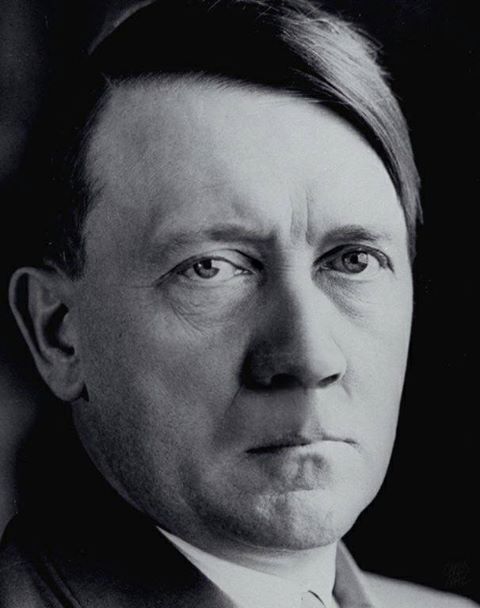
Hitler’s Finances and the Myth of Nazi Anti-Usury Activism
(Left: the Emperor wears no moustache……) There is the widespread notion that Hitler was fighting the Money Power and that he was a problem for the Bankers because he created a Usury fre…
Note that some nationalists are also pushing a similar narrative, that Vladimir Putin is thwarting Rothschild central banking, yet the opposite is true. Tall tales die hard.
michael94
Member
- Joined
- Oct 11, 2015
- Messages
- 2,419
Migchels is wrong, as my source showed in many of the images I provided. Yes, they didnt abolish all interest on loans overnight, but they put an end to the Financial manipulation of the German economy by International Finance, and jubileed debt that was strangling important sectors of the German economy (like Agriculture) with subsidized interest free loans for newlyweds, among other things. That is not "a Myth of anti-Usury activism". That is observable and concrete anti-Usury activism, as was spending money into the economy for infrastructure without borrowing from any Banks. Banks did not just loan out as the pleased, the Reichsbank made the funds available that they could loan and limited that loans that manipulate markets, which is an important function of Usury for nefarious benefit (Source: see the images I posted above - Banking_ThirdReich2,4 and 7).Hitler’s Finances and the Myth of Nazi Anti-Usury Activism

Hitler’s Finances and the Myth of Nazi Anti-Usury Activism
(Left: the Emperor wears no moustache……) There is the widespread notion that Hitler was fighting the Money Power and that he was a problem for the Bankers because he created a Usury fre…realcurrencies.wordpress.com
Note that some nationalists are also pushing a similar narrative, that Vladimir Putin is thwarting Rothschild central banking, yet the opposite is true. Tall tales die hard.
Migchels is tunnel visioning too much on the fact that all interest was not abolished overnight. Usury as a means of controlling, oppressing and ultimately destroying Nations for the International Jew's benefit was completely thearted in Nazi Germany.
Migchels has a lot to learn, like the nature of Money and how it is tied to productive Work and Resources, not Gold. Speaking of Gold, there is another example of "anti-Usury activism" which I have already posted about but will repeat. The Third Reich was circumventing the International Gold trade standard by trading via large scale barter and putting its usefulness into question. This is admitted by the Bank of International Settlements in 1941! International Finance has always profitted heavily off loaning out Gold ( at Usury ) so countries can settle trade balances.
One last thing - There was no Rothschild Central Bank in Germany. The Reichsbank was completely under NSDAP control. The Rothschilds ended up leaving Germany and I will attach an image of an exhibition that was made in France under German occupation about the Rothschilds.
Attachments
Last edited:
Pistachio
Member
- Joined
- Aug 22, 2019
- Messages
- 763
It looks like Jewry was guiding the NSDAP all along, including the Reichsbank.Migchels is wrong, as my source showed in many of the images I provided. Yes, they didnt abolish all interest on loans overnight, but they put an end to the Financial manipulation of the German economy by International Finance, and jubileed debt that was strangling important sectors of the German economy (like Agriculture) with subsidized interest free loans for newlyweds, among other things. That is not "a Myth of anti-Usury activism". That is observable and concrete anti-Usury activism, as was spending money into the economy for infrastructure without borrowing from any Banks. Banks did not just loan out as the pleased, the Reichsbank made the funds available that they could loan and limited that loans that manipulate markets, which is an important function of Usury for nefarious benefit (Source: see the images I posted above - Banking_ThirdReich2,4 and 7).
Migchels is tunnel visioning too much on the fact that all interest was not abolished overnight. Usury as a means of controlling, oppressing and ultimately destroying Nations for the International Jew's benefit was completely thearted in Nazi Germany.
Migchels has a lot to learn, like the nature of Money and how it is tied to productive Work and Resources, not Gold. Speaking of Gold, there is another example of "anti-Usury activism" which I have already posted about but will repeat. The Third Reich was circumventing the International Gold trade standard by trading via large scale barter and putting its usefulness into question. This is admitted by the Bank of International Settlements in 1941! International Finance has always profitted heavily off loaning out Gold ( at Usury ) so countries can settle trade balances.
One last thing - There was no Rothschild Central Bank in Germany. The Reichsbank was completely under NSDAP control. The Rothschilds ended up leaving Germany and I will attach an image of an exhibition that was made in France under German occupation about the Rothschilds.
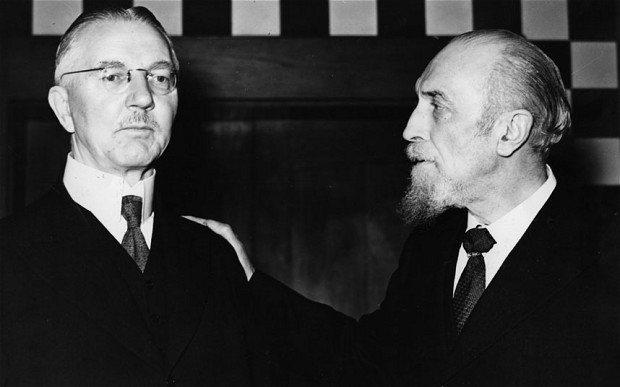
Hjalmar Schacht (left), Hitler's finance minister, with his close friend Montagu Norman, Governor of the Bank of England from 1920 to 1944.
Everything else we know about the Nazis point to the same conclusion: controlled opposition to world Jewry. But that shouldn't surprise you.In addition to this compelling evidence of the hidden hand of Rothschild influence and control, the Telegraph newspaper published an article on 31/07/2013, detailing the revelations contained in documents released by the Bank of England, concerning the transfer of Czech gold to the Reichsbank BIS account. The article stated:
“The documents reveal a shocking story: just six months before Britain went to war with Nazi Germany, the Bank of England willingly handed over £5.6 million worth of gold to Hitler – and it belonged to another country.
The official history of the bank, written in 1950 but posted online for the first time on Tuesday, reveals how we betrayed Czechoslovakia – not just with the infamous Munich agreement of September 1938, which allowed the Nazis to annex the Sudetenland, but also in London, where Montague Norman, the eccentric but ruthless governor of the Bank of England agreed to surrender gold owned by the National Bank of Czechoslovakia.
The Czechoslovak gold was held in London in a sub-account in the name of the Bank for International Settlements, the Basel-based bank for central banks. When the Nazis marched into Prague in March 1939 they immediately sent armed soldiers to the offices of the National Bank. The Czech directors were ordered, on pain of death, to send two transfer requests.
The first instructed the BIS to transfer 23.1 metric tons of gold from the Czechoslovak BIS account, held at the Bank of England, to the Reichsbank BIS account, also held at Threadneedle Street.
The second order instructed the Bank of England to transfer almost 27 metric tons of gold held in the National Bank of Czechoslovakia’s own name to the BIS’s gold account at the Bank of England.” Never mind the Czech gold the Nazis stole...
Last edited:
Pistachio
Member
- Joined
- Aug 22, 2019
- Messages
- 763
We see a clear pattern here of the Rothschild Bank of International Settlements funding their supposed enemies, The Soviet Union (now "Russia), and the Nazis.
It's all damned theater, I tell you. Hitler and Putin have been playing their parts in the charade.
It's all damned theater, I tell you. Hitler and Putin have been playing their parts in the charade.
beeohbeebeewhy
Member
- Joined
- Feb 7, 2021
- Messages
- 59
Solid research on Schwab, can’t believe Kissinger was his teacher lmao. Do you know the source for Schwab calling Kissinger one of his greatest influences? I’d be interested in reading it.
A character I read about recently who fits in very nicely with Schwab and the Club of Rome is Julian Huxley, the brother of Aldous Huxley, and first director of UNESCO (as well as a president of the British Eugenics Society). He was pretty open about being a Neo-Malthusian eugenicist and coined the term “transhumanism”. I think you’d be interested in his writings since they are more transparent than Schwab’s, there’s no beating around the bush or real attempt at palatability for the average person.
Evolutionary Humanism is a collection of essays where he spells things out, if you don’t have the time to read all of it I’d recommend reading the last essay in the collection, “Eugenics in Evolutionary Perspective”. The essay where he coins transhumanism is called “Transhumanism” (originally entitled “New Bottles for New Wine”).
As for the Nazi Germany arguments going on, I think too many ppl get caught up in the triple parentheses memes or Z0”G” brain stuff, ofc the Israeli lobby is powerful, as well as the families, but I don’t really buy Nazi Germany as being the good guys given their eugenics programs and funding from Anglo-American bankers and industrialists, that’s just my current understanding of it. I haven’t read all that much ab it
A character I read about recently who fits in very nicely with Schwab and the Club of Rome is Julian Huxley, the brother of Aldous Huxley, and first director of UNESCO (as well as a president of the British Eugenics Society). He was pretty open about being a Neo-Malthusian eugenicist and coined the term “transhumanism”. I think you’d be interested in his writings since they are more transparent than Schwab’s, there’s no beating around the bush or real attempt at palatability for the average person.
Evolutionary Humanism is a collection of essays where he spells things out, if you don’t have the time to read all of it I’d recommend reading the last essay in the collection, “Eugenics in Evolutionary Perspective”. The essay where he coins transhumanism is called “Transhumanism” (originally entitled “New Bottles for New Wine”).
As for the Nazi Germany arguments going on, I think too many ppl get caught up in the triple parentheses memes or Z0”G” brain stuff, ofc the Israeli lobby is powerful, as well as the families, but I don’t really buy Nazi Germany as being the good guys given their eugenics programs and funding from Anglo-American bankers and industrialists, that’s just my current understanding of it. I haven’t read all that much ab it
michael94
Member
- Joined
- Oct 11, 2015
- Messages
- 2,419
Hjalmar Schacht was a holdover of the Reichsbank from the Weimar period. He was kept in his position out of convenience, and he had a working knowledge of International Finance. He was booted from the Reichsbank in the late 1930s because he refused to go along with Nazi expenditure plans, and was later placed in a concentration camp after being part of a plot to assassinate Hitler. Essentially he was useful for a while, and then stopped being useful and was removed and replaced with Walther Funk, who was Gottfried Feder's protege. No Schacht was not installing Rothschild or World Jewry plans with the NSDAP as cover... but he did try to obstruct a lot of the NSDAP economic goals. Hitler also called Schacht a Freemason in Hitler's Table Talk, featured in this audio discussion.It looks like Jewry was guiding the NSDAP all along, including the Reichsbank.

Hjalmar Schacht (left), Hitler's finance minister, with his close friend Montagu Norman, Governor of the Bank of England from 1920 to 1944.
Everything else we know about the Nazis point to the same conclusion: controlled opposition to world Jewry. But that shouldn't surprise you.
"Hitler's Table Talk" Study Hour: Episode 51 | Carolyn Yeager
March 19, 2015 "If Stalin had been given another 10 or 15 years, Russia would have become the mightiest State in the world." -Adolf Hitler Carolyn Yeager and Ray Goodwin read and comment on the Aug. 25-28, 1942 lunch and dinner table monologues by the German Leader, as taken down in shorthand by...
Last edited:
michael94
Member
- Joined
- Oct 11, 2015
- Messages
- 2,419
First, the Munich Agreement in 1938 was not a betrayal of the Czechs, the Sudetenland was a German area and Czechoslovakia as a whole was a failed state kept under control solely by the Czechs. After the Munich Agreement the Slovaks contacted the Reich Government with their intention to secede and they received the Third Reich's full support. This is what led to the events leading to the annexation of Czechoslovakia. The Slovaks separated, then both Poland and Hungary invaded Czechoslovakia to take land that they considered theirs. Essentially there was a power vacuum in the aftermath and Hitler gave an ultimatum to the Czechs to be annexed or invaded, in order to not allow the Soviets to take advantage nor to allow the instability on their new Sudetenland border.In addition to this compelling evidence of the hidden hand of Rothschild influence and control, the Telegraph newspaper published an article on 31/07/2013, detailing the revelations contained in documents released by the Bank of England, concerning the transfer of Czech gold to the Reichsbank BIS account. The article stated:
“The documents reveal a shocking story: just six months before Britain went to war with Nazi Germany, the Bank of England willingly handed over £5.6 million worth of gold to Hitler – and it belonged to another country.
The official history of the bank, written in 1950 but posted online for the first time on Tuesday, reveals how we betrayed Czechoslovakia – not just with the infamous Munich agreement of September 1938, which allowed the Nazis to annex the Sudetenland, but also in London, where Montague Norman, the eccentric but ruthless governor of the Bank of England agreed to surrender gold owned by the National Bank of Czechoslovakia.
The Czechoslovak gold was held in London in a sub-account in the name of the Bank for International Settlements, the Basel-based bank for central banks. When the Nazis marched into Prague in March 1939 they immediately sent armed soldiers to the offices of the National Bank. The Czech directors were ordered, on pain of death, to send two transfer requests.
The first instructed the BIS to transfer 23.1 metric tons of gold from the Czechoslovak BIS account, held at the Bank of England, to the Reichsbank BIS account, also held at Threadneedle Street.
The second order instructed the Bank of England to transfer almost 27 metric tons of gold held in the National Bank of Czechoslovakia’s own name to the BIS’s gold account at the Bank of England.” Never mind the Czech gold the Nazis stole...
As for the Gold, it doesn't show anything about Rothschilds of International Jewry running the Third Reich -- as you seem to be implying -- just that the Third Reich had not been completely cut off from all foreign dealings with the BIS or England, which they were at least ostensibly still on good terms with at the time. Withholding the assets of another Nation is considered a huge affront, and is often a hallmark of the beginnings of War. I'm sure you're aware that Gold was used as an International Trade Standard going back centuries, and the Third Reich did not overnight remove themselves from this system. The fact is that countries still wanted Gold as payment so it was useful to even the Nazis, but becoming less necessary as I showed above with increases in large-scale barter off the Gold standard.
michael94
Member
- Joined
- Oct 11, 2015
- Messages
- 2,419
This (in bold) has been spread, but I will make a case that there is no substance to it. The NSDAP was not even brought to power by GERMAN Industrialist funding, let alone Anglo-American Bankers or industrialists. The NSDAP did not receive mainstream funding until the March 1933 Elections when they already in power. Before then, they did receive a few contributions from German Industrialists like Fritz Thyssen, but it was for legitimate fear of Communism. I will refer to Thyssen again below because he ties into the alleged "Bush-Nazi" connection. Henry Ashby Turner in his book German Big Business and the Rise of Hitler says this -Solid research on Schwab, can’t believe Kissinger was his teacher lmao. Do you know the source for Schwab calling Kissinger one of his greatest influences? I’d be interested in reading it.
A character I read about recently who fits in very nicely with Schwab and the Club of Rome is Julian Huxley, the brother of Aldous Huxley, and first director of UNESCO (as well as a president of the British Eugenics Society). He was pretty open about being a Neo-Malthusian eugenicist and coined the term “transhumanism”. I think you’d be interested in his writings since they are more transparent than Schwab’s, there’s no beating around the bush or real attempt at palatability for the average person.
Evolutionary Humanism is a collection of essays where he spells things out, if you don’t have the time to read all of it I’d recommend reading the last essay in the collection, “Eugenics in Evolutionary Perspective”. The essay where he coins transhumanism is called “Transhumanism” (originally entitled “New Bottles for New Wine”).
As for the Nazi Germany arguments going on, I think too many ppl get caught up in the triple parentheses memes or Z0”G” brain stuff, ofc the Israeli lobby is powerful, as well as the families, but I don’t really buy Nazi Germany as being the good guys given their eugenics programs and funding from Anglo-American bankers and industrialists, that’s just my current understanding of it. I haven’t read all that much ab it
“To What extent did the men of German big business undermine the Weimar Republic? To what extent did they finance the Nazi party and use their influence to boost Hitler into power? As should be evident by this point the answer in both cases is a great deal less than has generally been believed. Only through gross distortion can big business be afforded a crucial or even a major role in the downfall of the republic. The early growth of the NSDAP Took place without any significant aid from the circles of large-scale enterprise. Centered in industrially underdeveloped Bavaria, tainted with illegality as a consequence of a failed beer hall putsch of 1923, saddled with a program containing disturbingly anti-capitalist planks and amounting only to a raucous splinter group politically, The NSDAP languished in disrepute in the eyes of most men of big business throughout the latter part of the 1920s. The major main executives of Germany proved with rare exception resistant to the blandishments of Nazis including Hitler himself, who sought to reassure the business community about their party’s intentions. Only the electoral breakthrough of 1930, achieved without aid from big business drew attention to it from that quarter. From The Development and Character of the Nazi Political Machine, 1928-1930, and the Nsdap Electoral Breakthrough;
After weighing all the evidence. We must recognize that the financial subsidies from industry were overwhelmingly directed against the Nazis. Bulk of the funds in the party treasury came from membership dues.”
What Americans did do, was do business in Germany, as is natural for any promising and heavily industrialized Nation. This is very different from the sort of "funding" you might be alluding to. I'm sure you have heard people repeat the "Bush Nazi" connection before, well do you know what the connection actually was? It was because of the Bush's connection to Fritz Thyssen via the Union Banking Co. The Bush connection is only that they managed some of Thyssen's assets via the Union Banking Corporation. It's extremely weak in my opinion and has been overblown to the point of absurdity. The same for the "Wall Street" connections via Harriman Brothers International which was connected to Bush.
Here's a Guardian article on the matter so you can see for yourself and decide. Harriman is also mentioned there if you ctrl+f - How Bush's grandfather helped Hitler's rise to power
Keep in mind that this same Harriman was agitating for War against Hitler later on, despite supposedly having been an instrumental backer of Hitler. In fact the only connection is as offering financial services for Thyssen, who did give the NSDAP money.
Who Wanted War?
If some industrialists and businessmen such as Henry Ford Sr. did not want war and supported the America First Committee, others, including those supposedly pro-Nazi, were clamoring for aid to Britain and antagonism towards Germany well before Pearl Harbor. Senator Rush D. Holt, a liberal pacifist, during the last session of the 76th Congress, exposed the oligarchs promoting belligerence against Germany. Commenting on an influential committee, Defend America by Aiding the Allies, headed by newspaperman William Allen White, to agitate for war against Germany, or at least “all aid short of war” to Britain, Senator Holt said the founders included “eighteen prominent bankers.” Among those present at its April 1940 founding were Henry L. Stimson, who had served as counsel for J. P. Morgan and senior Morgan partner Thomas W. Lamont.[91] The campaign began on June 10, 1940, with advertisements entitled “Stop Hitler Now” appearing in newspapers throughout the USA. There was an allusion to the advertisements being paid for by “a number of patriotic American citizens.” On July 11 Senator Holt spoke to the Senate on the advertisement:
Holt, referring to a list of names of the advertisement sponsors, stated that they are not the types who die in battle, or the fathers of those who die in battle. He named the wives of international financiers W. Averell Harriman,[93] H. P. Davison,[94] the late Daniel Guggenheim,[95] and John Schiff of Kuhn, Loeb & Co. Other sponsors included Frederick M. Warburg,[96] a partner of Kuhn, Loeb & Co.; Cornelius V. Whitney, mining magnate associated with Rockefeller and Morgan interests; and Thomas W. Lamont of J. P. Morgan Co. In communications, there was Henry Luce, publisher of Time, and Samuel Goldman, the Hollywood mogul. Holt described these sponsors not as “patriots,” but as “paytriots.”You find it is not the little fellows who paid for this advertisement, “Stop Hitler Now!” … Listen to these banks. The directors of these banks, or the families of directors, paid for this advertisement. Who are they? No wonder they want Hitler stopped. Director of J. Pierpont Morgan & Co.; Director of Drexel & Co.; Director of Kuhn, Loeb Co., - Senators have heard that name before – Kuhn, Loeb & Co. international banking. No wonder Kuhn, Loeb & Co. helped finance such an advertisement. A Director of Lehman Bros., another international banking firm, helped pay for this “Stop Hitler” advisement, and a number of others.[92]
source - The Myth of the Big Business-Nazi Axis | CODOH
EMF Mitigation - Flush Niacin - Big 5 Minerals
Similar threads
- Replies
- 6
- Views
- 2K
P
- Replies
- 20
- Views
- 5K
- Replies
- 0
- Views
- 1K
- Replies
- 3
- Views
- 1K
- Replies
- 5
- Views
- 2K
- Replies
- 24
- Views
- 3K
- Replies
- 42
- Views
- 8K
- Replies
- 24
- Views
- 4K
P
- Replies
- 3
- Views
- 3K
J
- Replies
- 1
- Views
- 708

